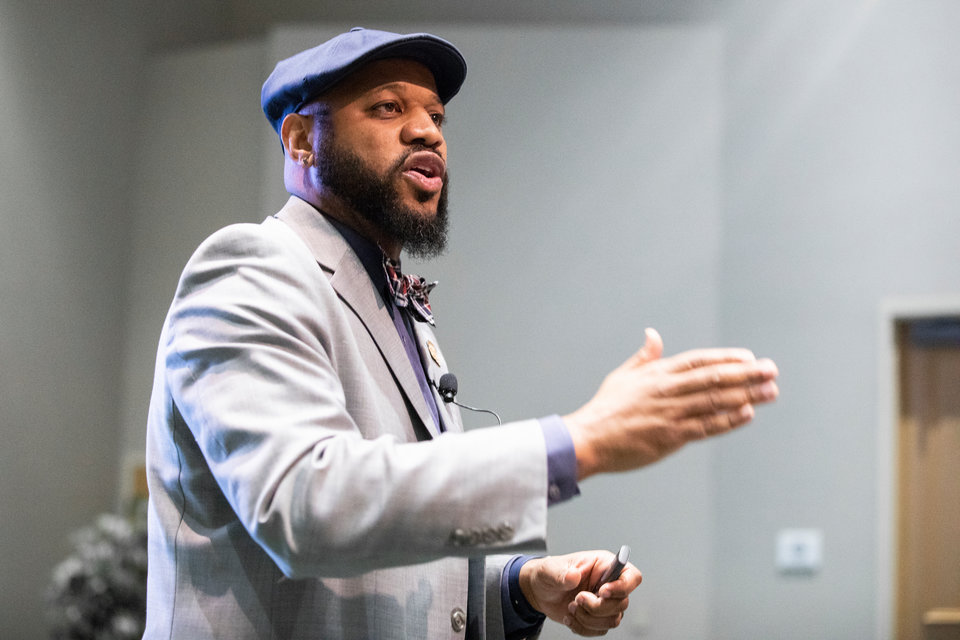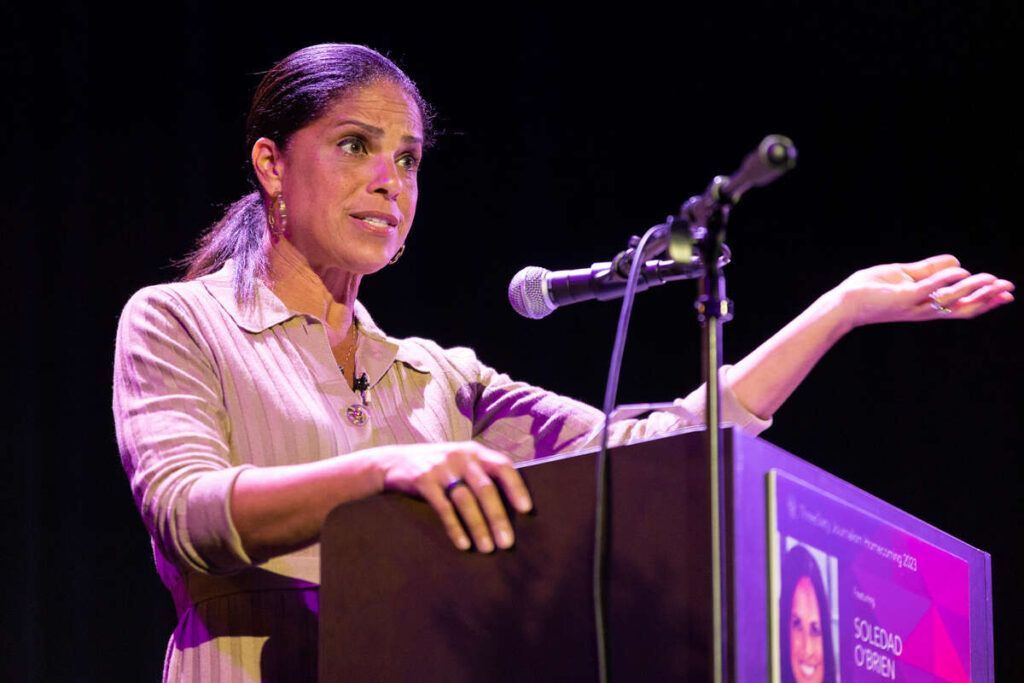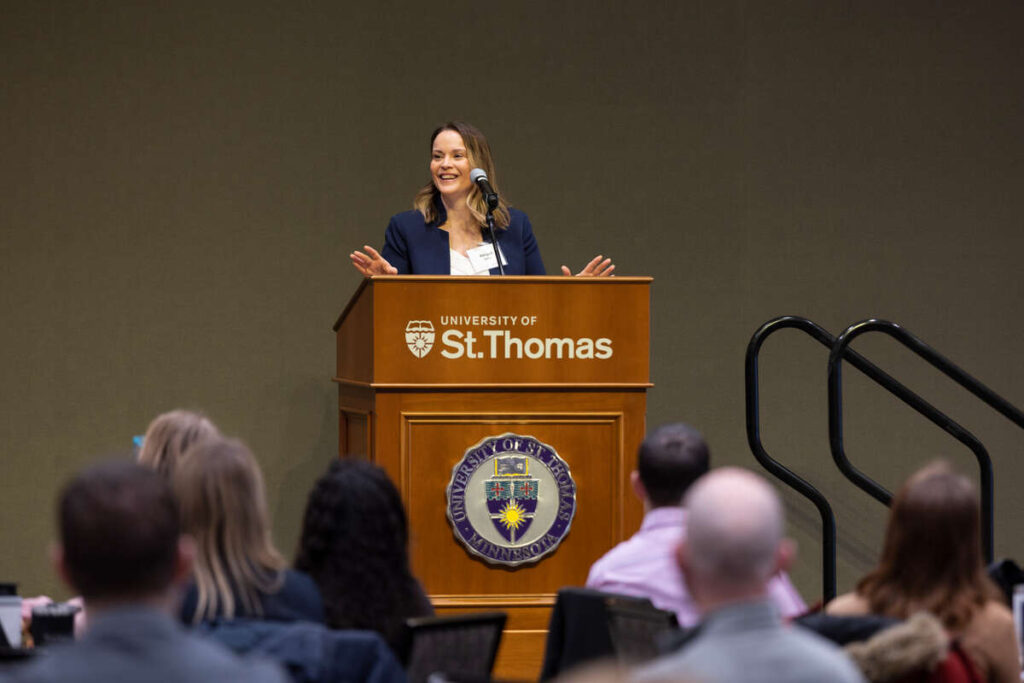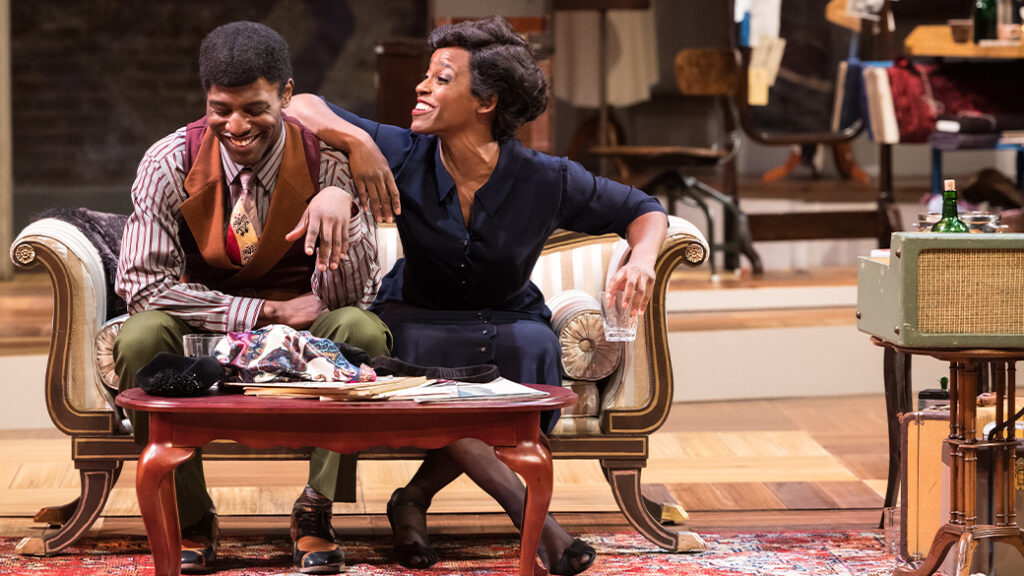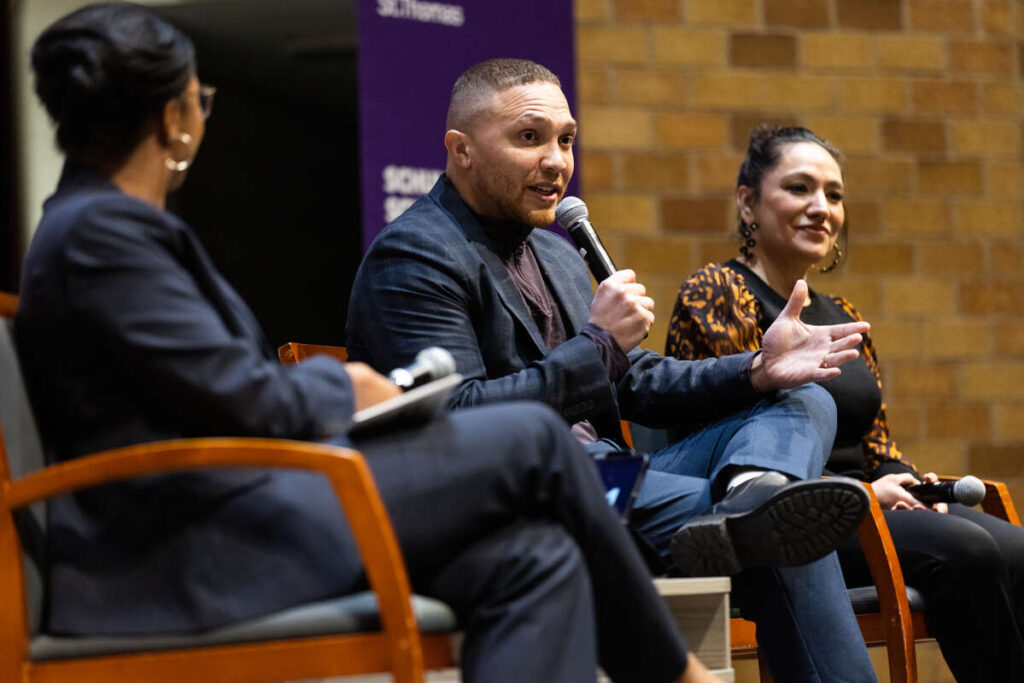Educator Michael V. Walker spoke about assisting black male youth achieve success at the School of Education Dean’s Forum on Dec. 4 at Thornton Auditorium on the Minneapolis campus. Walker presented on the topic “Why Not Black Males?” where he examined the current educational system and its attempts to “fix” black males. He emphasized black males are not broken; it is the educational system that’s in need of repair.
In his role as Minneapolis Public Schools’ director of the Office of Black Male Student Achievement (OBMSA), Walker calls himself an “unapologetic advocate for black males” helping discover their greatness and change outcomes for those who attend Minneapolis Public Schools (MPS). In Minnesota, the achievement gap between black and white students is one of the widest in the country; OBMSA, which was created in 2014, is focused on closing that gap.
Early in his talk, Walker – a former assistant principal of Roosevelt High School and community outreach, and program and youth development director at the YMCA of Minneapolis and Greater St. Paul – stated the OBMSA mission:
“We exist to awaken the greatness within black males in MPS, to have them determined to believe and achieve success, as defined by their own values and dreams.”
OBMSA staff has seen positive results from students attending their classes, including rising GPAs, decreased drop out rates and higher rates of being on track for graduation, Walker said. While there have been successes, Walker acknowledged there’s a lot more work to be done.
While the 90-minute talk was wide ranging, Walker focused on his experience with OBMSA and included time throughout for discussions with the audience. Here are five observations from Walker’s talk.

Guest speaker Michael Walker from the Office of Black Male Achievement in Minneapolis Public Schools presents in the Thornton Auditorium on the Minneapolis campus.
Black male students are called kings by OBMSA staff.
One way Walker is changing negative narratives around black males is by replacing them with positive ones.
“There are a lot of different negative terms to call black men,” he said. “So we use the term ‘king.’ That’s one reason. Another reason is because of where we come from. We were different before we were slaves. They sold us, brought us here and made us slaves, but we came from Africa, a place where we were kings and queens.
“When we look at each other, we want to make sure we're upholding that,” Walker continued. “When I call you a king, how are you representing a king? How are you representing yourself? How are you representing each other? It's a way to show endearment to each other, and also show that I respect you and that I want the best for you.”
The Office of Black Male Student Achievement’s mission statement was informed by adult and student voices.
When they were shaping what OBMSA was going to look like, Walker said, it was important to get input not just from adults but to make sure student voices were heard, as well. In the school system, we ask for people’s perspective and voice, he said, and too often we don’t do anything with it.
“I make sure that when I'm asking our young kings [students] to be a part of something, their voice matters. They're going to see it being represented in all that we do,” Walker said. “Now they've got some trust and belief that what they say matters and what they say is valued. I want to make sure that I instill that in everything kings are involved – every single thing that we do.”
Walker discovered a system of broken beliefs.
When he first started his job with OBMSA, Walker went on what he calls “100 days of discovery” where his main goal was getting out into the community and listening to people’s thoughts, concerns and ideas. He talked to key stakeholders, community members, parents and families and, most importantly, black males. He connected with marginalized students and families by doing walking tours in their neighborhoods, stopping by barber shops and hair salons, attending police and firefighter barbeques and checking in at community centers.
What Walker kept hearing was that there was a system of broken beliefs. Families didn’t believe the educational system was fair and equitable when it came to dealing with their black male students. He talked to community members who didn’t believe the educational system was serving all students. Some educators didn’t believe they had the tools necessary to support black males in the classroom. In some spaces he visited, there was a belief black males couldn’t be successful in the classroom.
“When I talked to the young men, unfortunately, they didn’t feel connected to their schools,” Walker said. “They didn’t feel valued or that they were learning about their true history. It was this crazy system of all these broken beliefs.”
In his role with OBMSA, Walker created a belief framework with three focus areas: professional development for educators, authentic engagement with families and communities, and direct service with black male students.
Work has to be done with both students and adults, said Walker, who pointed out that decisions are being made when children are just starting school that will impact their entire lives. With professional development, educators can start to reflect on their practices.
“Our babies have to come to school every single day; they don’t get the ability to pick and choose,” Walker said. “But we do as adults. My stance is that we can no longer pick and choose if we are serious about this work – we have to take a stand. We have to become unapologetic advocates for black males. We have to realize that no one has ever stood up for our black males in our school system – ever.”
Walker also said educators have to be aware some families have experienced educational trauma and that might be a reason they don’t feel comfortable in a school setting, while others aren’t shy about showing up and sharing their feelings. Authentic engagement with all families is vital.
“In our department, I had an initiative where, when we call a student’s home, if there is a man listed on the emergency contact list, we’re going to ask for the father,” Walker said. “You want to reengage those fathers into the process. We try to be very intentional about that.”
All narratives are valued in B.L.A.C.K. classes.
This semester in Minneapolis Public Schools, there are 293 black men enrolled in a daily class called B.L.A.C.K., which stands for Building Lives Acquiring Cultural Knowledge. Students are called kings and teachers are known as coaches because their role is to facilitate learning. Currently, the yearlong program is in five high schools, four middle schools and offered in “pull-out” sessions for elementary students.
Classes include listening sessions, tutoring, goal setting (both academic and personal) and off-campus events, including college tours. Curriculum is inspired by the questions: Who am I? Who are we? What is our current state? Where am I going? How do I get there? Once I’m there, how do I stay?
“Those are the big questions that we’re asking ourselves in these spaces, while also calling upon the historical information of who we are as black people and black kings,” Walker said.
Classes are nonjudgmental spaces filled with conversation and dialogue where students take care of each other.
“We make sure our kings have a space to share,” Walker said. “If we’re talking about a certain topic, we want them to tell us their story because we may not know it. We bring value to that perspective, we bring voice to it. It’s really important in our space that teaching is a two-way street; it’s not just the teacher giving all the information.”
